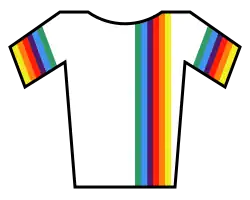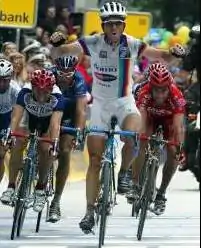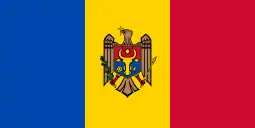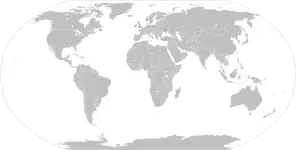UCI Road World Cup
The UCI Road World Cup was a season-long road cycling competition held from 1989 until 2004 and comprising ten one-day events.
 World Cup leader jersey | |
| Formerly | Super Prestige Pernod International |
|---|---|
| Sport | Road bicycle racing |
| Inaugural season | 1989 |
| Ceased | 2004 |
| Replaced by | UCI ProTour |
| Countries | International |
| Last champion(s) | |
| Most titles | |
| Related competitions | |
The World Cup was made up of around ten one-day races chosen from the prestigious classics. An individual classification and a team classification were established. In the last editions, the first 25 in each round scored from 100 to 1 points. During these events, the provisional leader of the classification wore a distinctive jersey.
History

The competition was inaugurated in 1989, and replaced the Super Prestige Pernod International. In the first three years, the competition was sponsored by Perrier. The competition determined a winning individual, and a winning team.
In 1989, the classics making up the World Cup were: Milan–San Remo, Tour of Flanders, Paris–Roubaix, Liège–Bastogne–Liège, Amstel Gold Race, Wincanton Classic (Newcastle), Grand Prix of the Americas (Montreal), Clásica de San Sebastián, Züri-Metzgete, Grand Prix de la Liberation (Team Time Trial in Eindhoven), Paris-Tours, Giro di Lombardia. In 1990, a final individual time trial was added in Lunel. In 1991, this time trial was contested in Bergamo (event counting as both the Grand Prix des Nations and the Trofeo Baracchi).
In 1992, the Grand Prix de la Liberation disappeared from the World Cup events. The Grand Prix of the Americas becomes the Grand Prix Téléglobe (it will disappear from the World Cup events the following year). That same year, the final time trial was definitively replaced by the Grand Prix des Nations, contested in Palma de Mallorca . In 1993, the Grand Prix des Nations was contested at Lac de Madine. He will disappear from the World Cup events the following year. In 1994, the Wincanton Classic became the Leeds International Classic.
In 1995, a new event was added to the calendar: the Frankfurt Grand Prix. It will be its only year as a World Cup event, just like the Japan Cup in 1996.
In 1997, the Leeds International Classic became the Rochester Classic. The following year it was replaced by the HEW Cyclassics in Hamburg . From that year, the 10 classics making up the World Cup are therefore: Milan-San Remo, Tour of Flanders, Paris-Roubaix, Amstel Gold Race, Liège-Bastogne-Liège, Hamburg Hew Cyclassics, Clásica de San Sebastián, Züri-Metzgete, Paris-Tours, Giro di Lombardia.
The World Cup disappeared with the creation of the ProTour and the continental circuits in 2005.
The record number of wins was Paolo Bettini's three consecutive wins in 2002, 2003, and the last edition in 2004. Three riders won the competition twice: Maurizio Fondriest (1991 and 1993), Johan Museeuw (1995 and 1996) and Michele Bartoli (1997 and 1998).
The competition was run in parallel to the UCI Road World Rankings, which included all UCI sanctioned events. Both were replaced at the end of the 2004 season with the inauguration of the UCI ProTour and UCI Continental Circuits.
Points distribution
Individual
Points are awarded for the best riders in each race according to the following scale:
From 1997, the rider in order to be taken into account in the final general classification, must participate in at least six of the 10 races.
| 1 | 2 | 3 | 4 | 5 | 6 | 7 | 8 | 9 | 10 | 11 | 12 | 13 | 14 | 15 | 16 | 17 | 18 | 19 | 20 | 21 | 22 | 23 | 24 | 25 | ||
|---|---|---|---|---|---|---|---|---|---|---|---|---|---|---|---|---|---|---|---|---|---|---|---|---|---|---|
| Points | Editions 1989[1] | 12 | 9 | 8 | 7 | 6 | 5 | 4 | 3 | 2 | 1 | |||||||||||||||
| Editions 1990-1991[2] | 25 | 22 | 20 | 18 | 16 | 15 | 14 | 13 | 12 | 11 | 10 | 9 | 8 | 7 | 6 | 5 | 4 | 3 | 2 | 1 | ||||||
| Editions 1992-1996[3] | 50 | 35 | 25 | 20 | 18 | 16 | 14 | 12 | 10 | 8 | 6 | 5 | ||||||||||||||
| Editions 1997-2004[4] | 100 | 70 | 50 | 40 | 36 | 32 | 28 | 24 | 20 | 16 | 15 | 14 | 13 | 12 | 11 | 10 | 9 | 8 | 7 | 6 | 5 | 4 | 3 | 2 | 1 | |
Teams
A ranking of the teams has also been set up. During each race, the places of the first three riders of each team are added together. The team with the lowest total receives 12 points in the team standings, the second team receives nine, the third team receives eight and so on until the tenth team scores a point.
From 1997, the team in order to be taken into account in the final general classification, must participate in at least eight of the 10 races.
Races
The races with grey background existed but was not in the World Cup calendar for that year
| Race/Season | 1989 | 1990 | 1991 | 1992 | 1993 | 1994 | 1995 | 1996 | 1997 | 1998 | 1999 | 2000 | 2001 | 2002 | 2003 | 2004 |
|---|---|---|---|---|---|---|---|---|---|---|---|---|---|---|---|---|
| X | X | X | X | X | X | X | X | X | X | X | X | X | X | X | X | |
| X | X | X | X | X | X | X | X | X | X | X | X | X | X | X | X | |
| X | X | X | X | X | X | X | X | X | X | X | X | X | X | X | X | |
| X | X | X | X | X | X | X | X | X | X | X | X | X | X | X | X | |
| X | X | X | X | X | X | X | X | X | X | X | X | X | X | X | X | |
| X | X | X | X | X | X | X | X | X | X | X | X | X | X | X | X | |
| X | X | X | X | X | X | X | X | X | X | X | X | X | X | X | X | |
| X | X | X | X | X | X | X | X | X | X | X | X | X | X | X | X | |
| X | X | X | X | X | X | X | X | X | X | X | X | X | X | X | X | |
| X | X | X | X | X | X | X | X | X | ||||||||
| X | X | X | X | |||||||||||||
| X | X | X | ||||||||||||||
| X | ||||||||||||||||
| X | X | X[5] | X | X | X | X | X | X | X | X | X | X | X | X | ||
| X | X | X | X | X | X | X | X | X | X | X | X | X | X | X | X | |
| X | X | X | X | X | X | X | X | X | X | X | X | X | ||||
| X | X | X | X | X | X | X | X | X |
The final time trial (1990-1993) was an invitation event. The invited riders are the single Cup race winners, the first 10 of the general classification before the last race, the first 10 in the World Ranking and the reigning Wolrd Champion. Generally some riders forfeit their right to start and some others in the high classification of World Cup are invited.[6]
Jersey
After each race, the points gained for each rider were added to the current total. A special rainbow jersey was then presented to the leading rider in the overall ranking of the World Cup. He was obliged to wear this jersey in the further World Cup races as long as he held the lead in the overall standings. The jersey was issued for the first time in 1990 edition. It retained the same core design with minor modifications of logos and colors. Only in the first edition a grey-yellow jersey was awarded to the leader without the rainbow scheme.[7][8]
Winners
Individual
Teams
Records and statistics
- Most individual classification wins :
 Paolo Bettini (3).
Paolo Bettini (3). - Most team classification wins :
 Mapei (5).
Mapei (5). - Most single races wins in a career :
.svg.png.webp) Johan Museeuw (11),
Johan Museeuw (11), Erik Zabel (8),
Erik Zabel (8), Michele Bartoli (7),
Michele Bartoli (7), Paolo Bettini (6),
Paolo Bettini (6), Andrea Tafi (5),
Andrea Tafi (5),.svg.png.webp) Eric Van Lancker (4),
Eric Van Lancker (4),  Gianni Bugno (4),
Gianni Bugno (4), 

.svg.png.webp) Andrei Tchmil (4),
Andrei Tchmil (4),  Davide Rebellin (4),
Davide Rebellin (4),  Laurent Jalabert (4),
Laurent Jalabert (4),- eight shared riders (3),
- fiftheen shared riders (2),
- 59 shared riders (1).
- Most single races wins in a single season :
 Paolo Bettini (3 in 2003).
Paolo Bettini (3 in 2003).
- Most wins in a single World Cup race :
 Erik Zabel (4 Milan-San Remo).
Erik Zabel (4 Milan-San Remo). - Lead the general classification after all single races:
 Erik Zabel, 2000.
Erik Zabel, 2000. - Andrei Tchmil finished four times on the podium, representing three different nations (third in 1994 for Moldova, second in 1995 for Ukraine, first in 1999 and second in 2000 for Belgium).
.svg.png.webp) Johan Museeuw is the only rider that won the World Cup and the World Championship in the same year (1996).
Johan Museeuw is the only rider that won the World Cup and the World Championship in the same year (1996)..svg.png.webp) Oscar Camenzind (SUI) is the only rider winning a World Cup race wearing the rainbow jersey of World Champion (1998 Giro di Lombardia, after winning the World Championship the previous week).
Oscar Camenzind (SUI) is the only rider winning a World Cup race wearing the rainbow jersey of World Champion (1998 Giro di Lombardia, after winning the World Championship the previous week). Gianni Bugno is the only rider that won the World Cup and a Grand Tour in the same year (and in career), winning 1990 Giro d'Italia.
Gianni Bugno is the only rider that won the World Cup and a Grand Tour in the same year (and in career), winning 1990 Giro d'Italia. Maurizio Fondriest (in 1991) and
Maurizio Fondriest (in 1991) and  Paolo Bettini (in 2004) are the only riders that won the final classification without winning a single race.
Paolo Bettini (in 2004) are the only riders that won the final classification without winning a single race.- The winner of Milan–San Remo was the final Cup winner five times (1990, 1993, 1999, 2000, 2003) while the Liège–Bastogne–Liège winners (1989, 1997, 1998, 2002) and Züri-Metzgete/Grand Prix Suisse winners (1993, 1994, 1995, 1998) took the final Cup four times.
- The winners of Paris–Tours and Giro di Lombardia never won the final classification of World Cup in the same year. The same happened for the few time disputed events (Grand Prix des Amériques, 1990 UCI Road World Cup Finale, Grand Prix des Nations, Rund um den Henninger-Turm, Japan Cup).
See also
References
- "Milan-Sanremo" (in French). 2014-10-10. Archived from the original on 2014-10-10. Retrieved 2023-09-21.
- "Museeuw forfait" (in French). 2016-03-06. Archived from the original on 2016-03-06. Retrieved 2023-09-20.
- "LA COUPE DU MONDE, NOUVELLE VAGUE" (in French). 2016-03-03. Archived from the original on 2016-03-03. Retrieved 2023-09-20.
- "novita' , ora la Coppa del Mondo dara' punti per la classifica Uci". archiviostorico.gazzetta.it (in Italian). Retrieved 2023-10-04.
- 1991 Race was also valid as Trofeo Baracchi
- "LA FINALE DE LA COUPE DU MONDE A BERGAME. DEUX COURSES POUR LE PRIX D'UNE" (in French). 2014-11-08. Archived from the original on 2014-11-08. Retrieved 2023-09-25.
- "Premiazione Sean Kelly Merckx Verbrugghe Scotti Pdm - Milano- Giro di Lombardia 1989 - Scheda immagine n.120138 Sirotti.it". www.sirotti.it (in Italian). Retrieved 2023-09-25.
- "Premiazione Sean Kelly Eddy Merckx Hein Verbrugghe Pdm - Milano- Giro di Lombardia 1989 - Scheda immagine n.120148 Sirotti.it". www.sirotti.it (in Italian). Retrieved 2023-09-25.
